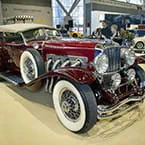Ways of getting classics stranded by parts shortages back on the road were discussed by the UK’s classic car clubs at the weekend.
Members of the Federation of British Historic Vehicle Clubs, FBHVC, regretted the difficulty in getting spares remanufactured at affordable prices and considered how modern technology like 3D printing and proposals for collective bargaining can provide a solution. Altogether the UK historic vehicle community cover more than 200 models for which the numbers involved are quite small, which makes it difficult getting parts remanufactured.
Describing the problem, Riley RM Club general secretary David Holden, declared that members have experienced problems getting parts remanufactured affordably in the past and said: “We’re hitting a brick wall – particularly when it comes to parts liability insurance and getting companies to manufacture parts in the sort of quantities most people are interested in. Unless we do something, it’ll get worse, with more cars staying off the road because the owners just can’t get the parts.”
The 6/80 & MO Club spokesperson, Colin Poland, said he was excited at the prospect of clubs using 3D printing to solve parts shortages. “The US Air Force already uses it and it’s being used to build a house in Amsterdam – I think it can do a lot for classic car owners,” he said.
Colin Poland proposed that classic crowd-funding may help to create buying power. ‘If every car club chucked a few hundred pounds into a 3D printing scheme, we would be able to afford the technology and the staff to print off any part we wanted,’ he said.
The FBHVC said it has discussed 3D printing, but its first aim was to help clubs to get parts remanufactured affordably.
Communications director Geoff Lancaster told CCW website: ‘We have a long-term ambition to build up a database of all of the organisations and clubs that have the capability to remanufacture parts, and to eventually make the information available online to help classic car owners.
“We want to build and develop the relationships with those organisations and to help clubs getting parts remanufactured by acting centrally. We wouldn’t get involved directly in remanufacturing, but we would look at acting as a facilitator so that it can be arranged centrally, saving individual clubs a lot of time and money.”
Vice-chairman Phil Homer added: ‘We cover more than 200 models and, in some cases, the numbers involved for the cars are quite small, so it’s difficult to justify getting parts remanufactured.’






